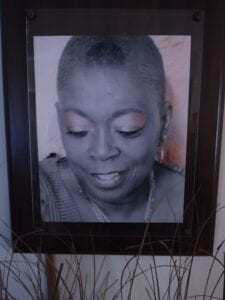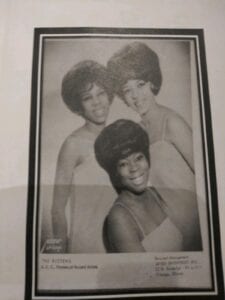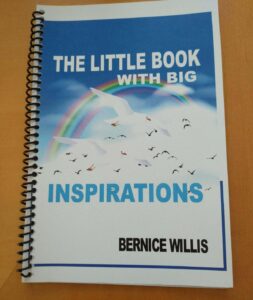February 26, 2021 | by Kelly Mitchell
Important Now
A Conversation with Black Woman Poet, Bernice Willis

KM: In the fall of 2019, when I took Dr. Gary Lemons’ “Bible as Literature” class at USF we spent an entire semester studying your book Poetic Expressions My Love to The World. I can’t tell you how much it meant to have you come visit our class as a guest speaker.
BW: I am still amazed at the responses from your class to my poems.
KM: In the introduction for Poetic Expressions, you tell us that you born on the West Side of Chicago.
BW: I was born the 7th child of 9 siblings. My sister and I had several brothers, so when I came along my sister took me under her wing and I thought she was my mother for a long time.
KM: Your Mother was busy with a lot of children. What was she like?
BW: Yeah, she had a child every two years. She was the backbone of our family and I appreciated her strength. In Poetic Expressions, I talk about my father. He was a pistol. He did harm with what he said. It hurt my self-esteem, and I never forgot those things. But I did experience the love my Mom shared with me in those painful experiences with my father.
KM: In Poetic Expressions, you provide information about your singing career. Tell me about the group you were in during high school, The Kittens. I must say I was a little star struck by the pictures you include in your book of you with Otis Redding, Muhammad Ali, and Aretha Franklin… wow. What it was like in those days?
BW: I had a voice and I could sing, so in high school, I recorded my first song with The Kittens and things took off. We were playing the nightclub circuit. We were recording songs, and we were on television. For about 15 years that was my life. We traveled a lot. We went to Germany, Paris, Canada. In those days we sang R&B, Pop, show tunes because our audiences at the nightclubs were Caucasian.

KM: What did you experience as a Black woman in the entertainment business in the ‘60s?
BW: I’ll tell you we had some issues. One particular nightclub, where all the patrons and waitresses were Caucasian, we had to get to the stage by walking through the crowd. There was one white man whose feet were in the aisle. Even though he knew we needed to pass, he kept his feet there. We just walked over them. Another time, we were doing a show in the Bahamas, at a resort. We had finished our first song, and no one applauded. At the end of our set, still no applause. It was like that sometimes.
KM: What was it like to be married and on the road performing?
BW: I sang solo for a while before I got married. My husband was a musician and dancer. We started our family. I could travel with one child, but it was hard, because I needed someone to watch the baby when I was practicing or onstage. With our next child it was too difficult, so I stayed in Chicago and did the night clubs. Money wasn’t always constant for entertainers.
When I was talking to my brother one day, he said, “Why don’t you go into nursing?” So I did. I went to school in Chicago and got my LPN – I did well because I had good study habits. I went back to school to become an RN when I was pregnant with my fourth child.
KM: It must have been difficult being pregnant, taking care of three other children and a home.
BW: People always say what they can’t do, but I was pregnant and taking care of a family, and riding the bus to school every day and I didn’t miss a beat. I was on the Dean’s List three times. When it was time to deliver my son, I was back in class the next week because I wanted to graduate with my class. I did, and I was second in my class. I try to inspire people when they say they can’t do something.
KM: When did you start writing poetry?
BW: I didn’t do much writing back then. I knew I could write, but it wasn’t in my spirit. I didn’t write until I came to Florida.

KM: How did you come to be in Florida?
BW: My husband was gone by then. My youngest son was graduating from high school and I had relatives down here. They asked me if I was tired yet of shoveling snow! Moving was a big thing. I had kids, so I needed a job and a place to live. I prayed for a whole year. I put my house on the market and it sold to the first couple who came to see it. That was that and I was on my way.
KM: So in 2018 you published your first book of poems, The Little Book with Big Inspirations. If I had to describe it in three words I would say real, raw and powerful. Where did all of the inspiration come from?
BW: My son’s friend introduced me to a Bible based church, and that’s when I met Gary – Reverend Dr. Lemons. He was one of the ministers at the church and my Bible class instructor. We were studying a book by Joseph Prince and we had assignments, just like Dr. Lemons did with you.
He wanted us to write daily so we could read and discuss what we thought. I was inspired and I wrote with every assignment. He said, “Bernice, can you put these words into poetry?” I put each assignment into a poem and that experience became the inspirational source for the concept of my first book.
KM: I reread your first book before our interview. I was blown away by how real your poems felt and how powerful they were. One of them really stood out for me. What was the background for your poem “He Can Bring ‘U’ Out”?
. . .
He Can Bring “U” Out
. . . . . . . . . . . . . . . . . Seek and “u” will find, knock and the door will open
. . . . . . . . . . . . . . . . . I know so many people male/female, even in my own
. . . . . . . . . . . . . . . . . family that became self-absorbed because of an addition
. . . . . . . . . . . . . . . . . Three fourths of them died at an early age, either from
. . . . . . . . . . . . . . . . . the destruction it caused to the body or an overdose,
. . . . . . . . . . . . . . . . . what, an exhibition
. . . . . . . . . . . . . . . . . Some were Christian, highly educated, had great jobs,
. . . . . . . . . . . . . . . . . multi-talented, kind, compassionate, world travelers had
. . . . . . . . . . . . . . . . . everything going for themselves but that didn’t seem to
. . . . . . . . . . . . . . . . . matter
. . . . . . . . . . . . . . . . . Some sought help from institutions over and over again
. . . . . . . . . . . . . . . . . was their desire or belief in God, not strong enough to
. . . . . . . . . . . . . . . . . turn that addiction in (evidently not).
. . . . . . . . . . . . . . . . . I know that if “u” call on him making the first step, He’ll
. . . . . . . . . . . . . . . . . help “u” make the next
. . . . . . . . . . . . . . . . . Or maybe they didn’t really believe or want to believe,
. . . . . . . . . . . . . . . . . That God was there, right there on the set
. . . . . . . . . . . . . . . . . Did they want to make that step or were their feet so
. . . . . . . . . . . . . . . . . elevated from the ground?
. . . . . . . . . . . . . . . . . Perhaps the euphoric float had them so high, they didn’t
. . . . . . . . . . . . . . . . . want to come down
. . . . . . . . . . . . . . . . . Addictions will destroy mind cells, body systems
. . . . . . . . . . . . . . . . . Family, marriage and friendships, your total existence
. . . . . . . . . . . . . . . . . Substances that cause addictions are such powerful
. . . . . . . . . . . . . . . . . manipulators, but I know, I know that I know,
. . . . . . . . . . . . . . . . . Nothing is too hard for God when you believe, and
. . . . . . . . . . . . . . . . . comprehend that He’ll bring “u” out; my my my, what a
. . . . . . . . . . . . . . . . . wonderful friend
BW: My brother was the inspiration. God can bring you out of whatever you’re in that is painful. Depression, drugs, addictions, even addictions to material things – they tell you what to do. As a Black woman whose spiritual life is Christian-based, I believe God is about love, compassion, embracing, help, lifting up your heart, spirit, your mind.
KM: Another poem that really impressed me is “Where “R” the Children?” What inspired you to write this poem?
. . .
Where “R” the Children
. . . . . . . . . . . . . . . . . Where are the children,
. . . . . . . . . . . . . . . . . When all the family dynamics, day to day,
. . . . . . . . . . . . . . . . . Challenges and calamities come into play?
. . . . . . . . . . . . . . . . . Are they right up front in the middle of disagreements,
. . . . . . . . . . . . . . . . . Anger, yelling and other insanities,
. . . . . . . . . . . . . . . . . With their eyes stretched wide open, full of tears,
. . . . . . . . . . . . . . . . . Looking confused, astonished, and shaking with fear,
. . . . . . . . . . . . . . . . . Or, are they sent into another room with a hug and smile,
. . . . . . . . . . . . . . . . . Hoping with great expectations
. . . . . . . . . . . . . . . . . That they can’t or don’t hear.
. . . . . . . . . . . . . . . . . The banging of pots and dishes
. . . . . . . . . . . . . . . . . As they smash against the wall,
. . . . . . . . . . . . . . . . . Leaving ever-lasting inerasable memories of love
. . . . . . . . . . . . . . . . . At is worse, has just been installed
. . . . . . . . . . . . . . . . . Into the minds of vulnerable ones,
. . . . . . . . . . . . . . . . . So young and innocent
. . . . . . . . . . . . . . . . . That mimic the ones closest to their heart and mind.
. . . . . . . . . . . . . . . . . For what they hear, do and repeat could be
. . . . . . . . . . . . . . . . . The cause of some troubling times.
. . . . . . . . . . . . . . . . . Now, don’t we have to be better examples
. . . . . . . . . . . . . . . . . For the future generations and always demonstrate
. . . . . . . . . . . . . . . . . Our best to the little sponges
. . . . . . . . . . . . . . . . . That are soaking up environmental situations.
. . . . . . . . . . . . . . . . . Love them with everything you have to humanly give,
. . . . . . . . . . . . . . . . . With the evidence that you want the best for them,
. . . . . . . . . . . . . . . . . Just as our heavenly Father gave us the best
. . . . . . . . . . . . . . . . . He had to give—
. . . . . . . . . . . . . . . . . His only begotten Son,
. . . . . . . . . . . . . . . . . A present we didn’t have to buy,
. . . . . . . . . . . . . . . . . A wonderful precious gem.
. . .
BW: It’s about children being abused. Where are the children… in the room, in front of their parents when, for example, the parents might be fighting? The children see the bad habits. The parents don’t seem to care about the negative impact of their behavior on their children. What you put in as parents, children soak up. It’s damaging.
KM: What was your goal in publishing these two book collections?

BW: Getting my love for life out into the world was my goal. To let others know that they are not alone and to encourage them to open up and tell their stories of survival. When we openly share our life stories, we release all that repressed, painful stuff which can hurt you. It’s painfully harmful to hold it in.
KM: What is your writing process?
BW: I get inspired. One of my children will say something, or something I’m reading will stand out and I get inspired. It comes fast – sometimes in the middle of the night I have to get up and write it down and try and figure it out in the morning.
KM: Finally, we are living in very troubled times. What would you say to someone about how to negotiate these difficult days?
BW: Right now, people are discouraged and feel like nobody cares. Sometimes you get so down in the pit, it’s hard to reach up. Stay focused. For me, I pray, I just remember how I survived certain situations. I believe God knows what happened and what will come. I want to inspire people who are hurting. We all got stuff we are dealing with in this day and time. I want to help people open up about their stuff. We like to harbor things but we need to let it out and let go of it.
. . .
Bernice Willis’ books can be found online. Poetic Expressions can also be found as an audiobook. She can be reached at gizzmowillis@gmail.com.




